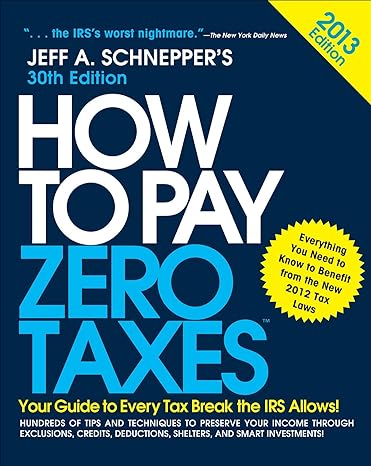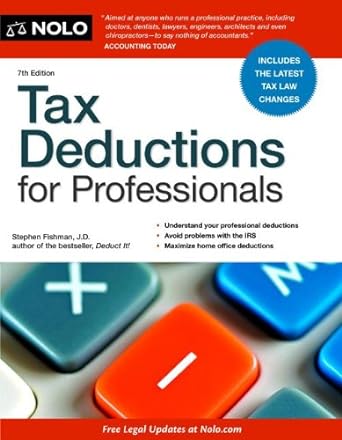Go back


How To Pay Zero Taxes Your Guide To Every Tax Break The IRS Allows(2013 Edition)
Authors:
Jeff Schnepper

Cover Type:Hardcover
Condition:Used
In Stock
Include with your book
Free shipping: May 14, 2024Popular items with books
Access to 3 Million+ solutions
Free ✝
Ask 10 Questions from expert
200,000+ Expert answers
✝ 7 days-trial
Total Price:
$0
List Price: $6.66
Savings: $6.66(100%)
Book details
ISBN: 0071803629, 978-0071803625
Book publisher: McGraw-Hill
Get your hands on the best-selling book How To Pay Zero Taxes Your Guide To Every Tax Break The IRS Allows 2013 Edition for free. Feed your curiosity and let your imagination soar with the best stories coming out to you without hefty price tags. Browse SolutionInn to discover a treasure trove of fiction and non-fiction books where every page leads the reader to an undiscovered world. Start your literary adventure right away and also enjoy free shipping of these complimentary books to your door.
How To Pay Zero Taxes Your Guide To Every Tax Break The IRS Allows 2013 Edition Summary: Hundreds of DEDUCTIONS, CREDITS, and EXEMPTIONS--updated for 2013!Fully updated for the new tax year, How to Pay Zero Taxes 2013 reveals all the secrets for keeping as much of your money as the law allows.How to Pay Zero Taxes 2013 lays out simple strategies that are sure to save you money--this year, next year, and beyond. From converting personal expenses into business deductions to avoiding--or surviving--an IRS audit, Jeff Schnepper's guide comprehensively covers more deductions than any other tax book, all conveniently organized into six easy-access categories: exclusions, credits, general deductions, "below the line" deductions, traditional tax shelters, and super tax shelters.How to Pay Zero Taxes provides everything you need to know about:New tax laws Exemptions, credits, and exclusions Special capital gains and dividends rules Increased IRA and retirement plan limits Job hunting and relocation expenses Theft and casualty losses Child care and elder care Educational and Roth IRAs
Customers also bought these books
Frequently Bought Together
Top Reviews for Books
Wanda Li
( 4 )
"Delivery was considerably fast, and the book I received was in a good condition."










